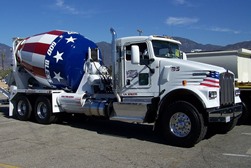How to Decide on the Right Trucker Classes near Princeton Alabama
 Congrats on your decision to become a trucker and enroll in a CDL school near Princeton AL. Perhaps it has always been your dream to hit the open highway while driving a monster tractor trailer. Or maybe you have done some research and have found that an occupation as a truck driver provides good income and flexible work prospects. Whatever your reason is, it's imperative to obtain the proper training by picking the right CDL school in your area. When evaluating your options, there are various variables that you'll want to examine prior to making your final selection. Location will no doubt be important, especially if you need to commute from your Princeton residence. The expense will also be important, but selecting a school based only on price is not the ideal way to guarantee you'll get the appropriate education. Don't forget, your objective is to master the knowledge and skills that will enable you to pass the CDL examinations and become a professional truck driver. So keeping that goal in mind, just how do you choose a truck driving school? The answer to that question is what we are going to discuss in the balance of this article. But first, we are going to talk a little bit about which CDL license you will eventually need.
Congrats on your decision to become a trucker and enroll in a CDL school near Princeton AL. Perhaps it has always been your dream to hit the open highway while driving a monster tractor trailer. Or maybe you have done some research and have found that an occupation as a truck driver provides good income and flexible work prospects. Whatever your reason is, it's imperative to obtain the proper training by picking the right CDL school in your area. When evaluating your options, there are various variables that you'll want to examine prior to making your final selection. Location will no doubt be important, especially if you need to commute from your Princeton residence. The expense will also be important, but selecting a school based only on price is not the ideal way to guarantee you'll get the appropriate education. Don't forget, your objective is to master the knowledge and skills that will enable you to pass the CDL examinations and become a professional truck driver. So keeping that goal in mind, just how do you choose a truck driving school? The answer to that question is what we are going to discuss in the balance of this article. But first, we are going to talk a little bit about which CDL license you will eventually need.
Which Commercial Drivers License Is Required?

To drive commercial vehicles legally within the United States and Princeton AL, a driver needs to obtain a CDL (Commercial Driver's License). The 3 classes of licenses that a driver can qualify for are Class A, Class B and Class C. Given that the topic of this article is how to pick a truck driving school, we will discuss Class A and Class B licenses. What differentiates each class of CDL is the kind of vehicle that the driver can operate in addition to the GVWR (Gross Vehicle Weight Rating) or GCWR (Gross Combination Weight Rating). Below are short summaries of the two classes.
Class A CDL. A Class A CDL is needed to drive any vehicle that has a GCWR of greater than 26,000 lbs., including a towed vehicle of greater than 10,000 lbs. A few of the vehicles that operators may be able to drive with Class A licenses are:
- Interstate or Intrastate Tractor Trailers
- Trucks with Double or Triple Trailers
- Tanker Trucks
- Livestock Carriers
- Class B and Class C Vehicles
Class B CDL. A Class B Commercial Drivers License is needed to operate single vehicles having a GVWR of greater than 26,000 lbs., or a GCWR of greater than 26,000 lbs. including a towed vehicle weighing up to 10,000 lbs. Some of the vehicles that drivers may be qualified to operate with Class B licenses are:
- Tractor Trailers
- Dump Trucks
- Cement Mixers
- Large Buses
- Class C Vehicles
Both Class A and Class B CDLs may also need endorsements to drive specific kinds of vehicles, including school or passenger buses. And a Class A license holder, with the proper needed endorsements, may operate any vehicle that a Class B license holder is qualified to drive.
How to Research a Trucking School

As soon as you have determined which CDL you want to pursue, you can start the undertaking of researching the Princeton AL truck driver schools that you are considering. As earlier discussed, location and cost will certainly be your initial considerations. But it can't be stressed enough that they should not be your only considerations. Other factors, for instance the reputations of the schools or the experience of the instructors are equally or even more important. So following are a few additional factors that you need to research while carrying out your due diligence prior to enrolling in, and especially paying for, your truck driver training.
Are the Schools Certified or Accredited ? Not many truck driving schools in the Princeton AL area are accredited due to the stringent process and expense to the schools. However, certification is more common and is offered by the Professional Truck Driver Institute (PTDI). A school is not obligated to become certified, but there are certain advantages. Interested students recognize that the training will be of the highest caliber, and that they will receive an ample amount of driving time. As an example, PTDI calls for 44 hours of real driving time, not simulations or ride-alongs. So if a school's course is certified (the course, not the school is certified), students know that the training and curriculum will comply with the very high benchmarks set by PTDI.
How Long in Business? One indicator to help determine the quality of a trucking school is how long it has been in operation. A poorly reviewed or a fly by night school usually will not be in business very long, so longevity is a plus. On the other hand, even the best of Princeton AL schools had to start from their first day of training, so use it as one of several qualifiers. You can also learn what the school's track record is relating to successful licensing and job placement of its graduates. If a school won't provide those stats, search elsewhere. The schools should additionally have relationships with regional and national trucking companies. Having a large number of contacts not only points to a superior reputation within the profession, but also boosts their job placement program for graduates. It also wouldn't hurt to contact the Alabama licensing department to verify that the CDL trucker schools you are reviewing are in compliance.
How Effective is the Training? As a minimum requirement, the schools must be licensed in Alabama and hire teachers that are experienced and trained. We will discuss more about the teachers in the following segment. Also, the student to instructor proportion should not be higher than 4 to 1. If it's any higher, then students will not be getting the individual attention they will need. This is particularly true concerning the one-on-one instruction for behind the wheel training. And watch out for any school that claims it can teach you to drive trucks in a relatively short period of time. Training to be an operator and to drive a tractor trailer professionally requires time. Most Princeton AL schools offer training programs that range from three weeks to as long as two months, depending on the class of license or type of vehicle.
How Experienced are the Teachers? As previously mentioned, it's important that the teachers are trained to teach driving techniques and experienced as both drivers and instructors. Although a number of states have minimum driving time criteria to be certified as an instructor, the more professional driving experience a teacher has the better. It's also crucial that the teachers keep up to date with industry advancements or any new laws or changes in regulations. Assessing teachers may be a little more intuitive than other standards, and perhaps the best method is to visit the school and speak with the instructors face to face. You can also speak with a few of the students going through the training and find out if they are happy with the level of instruction and the teacher's qualification to train them.
Plenty of Driving Time? Most importantly, a good truck driver school will provide plenty of driving time to its students. Besides, isn't that what it's all about? Driving time is the actual time spent behind the wheel driving a truck. Even though the use of simulators and ride-a-longs with other students are necessary training methods, they are no substitute for actual driving. The more training that a student receives behind the wheel, the better driver he or she will become. And even though driving time can vary among schools, a good benchmark is 32 hours at a minimum. If the school is PTDI certified, it will furnish no less than 44 hours of driving time. Check with the Princeton AL schools you are researching and ask how much driving time they furnish.
Are they Captive or Independent ? You can receive discounted or even free training from some trucking schools if you enter into an agreement to drive for a specific carrier for a defined time period. This is called contract training, and the schools that offer it are called captives. So rather than having associations with numerous trucking lines that they can place their graduates with, captives only work with one company. The tradeoff is receiving less expensive or even free training by surrendering the freedom to initially work wherever you have an opportunity. Obviously contract training has the potential to limit your income opportunities when beginning your new career. But for many it may be the ideal way to get affordable training. Just be sure to inquire if the Princeton AL schools you are considering are independent or captive so that you can make an informed decision.
Is there Onsite CDL Testing? There are a number of states that will permit 3rd party CDL testing onsite of trucking schools for its graduates. If onsite testing is available in Alabama, ask if the schools you are considering are DMV certified to offer it. One benefit is that it is more accommodating than contending with graduates from competing schools for test times at Alabama testing locations. It is moreover an indication that the DMV regards the authorized schools to be of a superior quality.
Are the Classes Convenient? As formerly mentioned, CDL training is only about 1 to 2 months in length. With such a brief duration, it's essential that the Princeton AL school you choose provides flexibility for both the curriculum and the scheduling of classes. As an example, if you're having a hard time learning a particular driving maneuver, then the teacher should be prepared to commit more time with you until you have it mastered. And if you're still working while going to training, then the class scheduling must be flexible enough to fit in working hours or other commitments.
Is Job Placement Offered? The moment you have obtained your CDL license after graduating from trucking school, you will be keen to start your new profession. Make sure that the schools you are considering have job placement programs. Ask what their job placement rate is and what average salary their grads start at. Also, ask which local and national trucking companies their graduates are placed with for hiring. If a school has a poor job placement rate or not many Princeton AL employers hiring their grads, it might be a clue to search elsewhere.
Is Financial Aid Provided? Trucking schools are similar to colleges and other Princeton AL area technical or vocational schools when it comes to loans and other forms of financial assistance being available. Find out if the schools you are evaluating have a financial assistance department, or at least someone who can help you navigate the options and forms that must be completed.
Learn More About Princeton CDL Driver Schools
Choose the Best Princeton AL Truck Driving Training
Selecting the right truck driving school is an important first step to starting your new occupation as a long distance or local truck driver. The skill sets that you will learn at school will be those that shape a new career behind the wheel. There are a number of options offered and understanding them is crucial to a new driver's success. However, you must obtain the necessary training in order to operate a big commercial vehicle in a professional and safe manner. If you are short on cash or financing, you might want to look into a captive school. You will pay a lower or in some cases no tuition in exchange for driving for their contracted carrier. Or you can choose an independent CDL school and have the the freedom to drive for the trucking firm of your choosing, or one of many associated with the school. It's your choice. But regardless of how you obtain your training, you will in the near future be part of a profession that helps America move as a professional trucker in Princeton AL.
